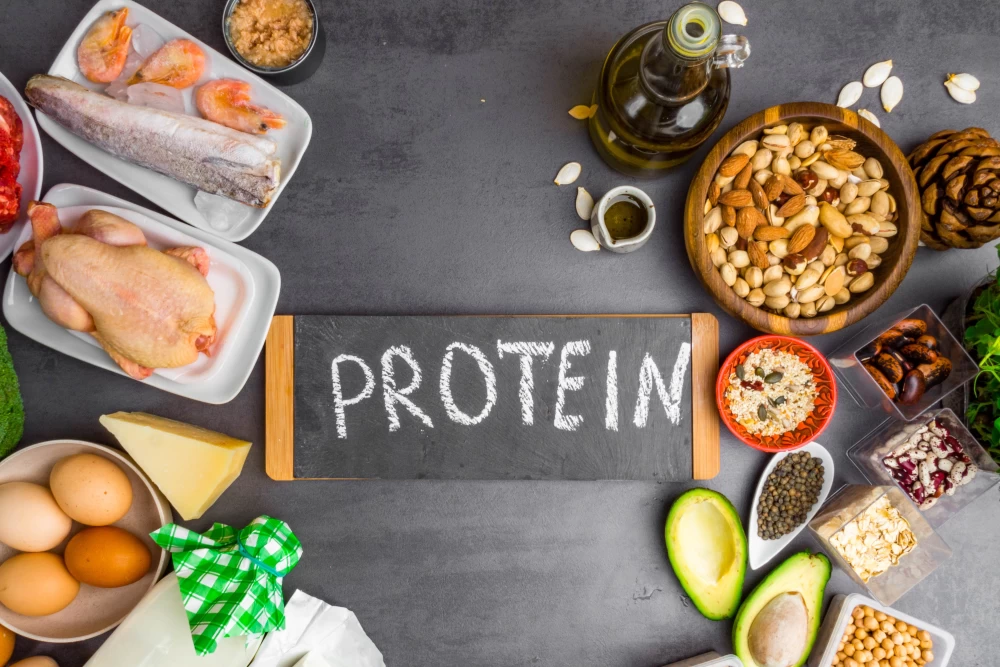
- 25th March 2023
What is Fatty Liver?
Fatty liver disease occurs when fat accumulates in the liver cells, causing inflammation and damage. This condition is closely linked to obesity, diabetes, and high cholesterol levels. One of the key dietary recommendations for managing fatty liver disease is to consume a diet that is low in fat and sugar but high in protein. Protein is essential for repairing damaged tissues, building muscle mass, and maintaining overall health. However, consuming too much protein can be detrimental to people with fatty liver disease as it can lead to excess ammonia production in the body which further damages the liver cells. Therefore, it's recommended that individuals with this condition consume moderate amounts of protein from lean sources such as chicken breast or fish. For those who want to include more plant-based proteins like beans or lentils into their diet should also pay attention to their carbohydrate intake as these foods contain carbohydrates that can quickly raise blood sugar levels leading to insulin resistance which could exacerbate fatty liver disease complications.
Protein Overview: Benefits and Risks
Protein is essential for the growth and repair of tissues in our body. It also plays a crucial role in building muscles, regulating hormones, and maintaining a healthy immune system. However, excessive intake of protein can pose various health risks such as kidney damage and increased risk of heart diseases. When it comes to fatty liver disease, the consumption of protein becomes even more critical. While proteins are necessary for liver function, consuming too much protein can strain the liver and worsen fatty liver disease. Hence, it is recommended that individuals with fatty liver disease should consume moderate amounts of high-quality protein sources such as lean meats, fish, dairy products, eggs and plant-based foods like beans or lentils. The recommended daily intake of protein varies based on age and gender; however, generally speaking, adults should consume about 0.8 grams per kilogram of body weight per day. Consulting with a healthcare professional or registered dietitian can help determine an individual’s specific dietary needs regarding their condition to ensure optimal health benefits while minimizing potential risks associated with inadequate or excessive consumption.
How Much Protein Should You Eat?
Fatty liver disease is a common condition that occurs when there is an excessive accumulation of fat in the liver cells. One of the main risk factors for fatty liver disease is obesity, which often results from consuming too much sugar and unhealthy fats. However, recent research has suggested that protein intake also plays a role in the development and progression of fatty liver disease. While protein is essential for maintaining muscle mass and promoting weight loss, consuming too much protein can be harmful to your liver. This is because excess protein intake can lead to an increase in ammonia production, which can put a strain on the liver's detoxification processes. As such, it's important to strike a balance between getting enough protein and not overloading your body with it. So just how much protein should you eat? The answer depends on several factors including age, sex, weight, activity level and overall health status. As a general rule of thumb though, most adults need around 0.8 grams of protein per kilogram of body weight each day. If you're trying to build muscle or lose weight through exercise then you may need more than this amount - up to 1 gram per kilogram or even higher depending on your goals and training intensity.

Types of Protein to Choose
When it comes to protein, not all types are created equal. If you have a fatty liver, choosing the right type of protein can make a big difference in managing your condition. One option is lean poultry such as chicken or turkey breast, which are low in saturated fat and high in protein. Fish is another good choice since it contains omega-3 fatty acids that can help reduce inflammation in the liver. If you prefer plant-based proteins, soy products like tofu and edamame can be a good source of protein without contributing to excess fat intake. Quinoa is also an excellent option as it contains all essential amino acids and is low in fat. However, it's important to note that some plant-based proteins may be higher in carbohydrates than animal-based proteins. Ultimately, when selecting the right type of protein for your diet with a fatty liver, lean options from both animal and plant sources are preferred over those that are high in saturated fats or added sugars. Incorporating these healthier choices into your meals will help you maintain a balanced diet while supporting your overall health goals.
Adopting a Healthy Diet
Fatty liver is a medical condition that results from excessive accumulation of fat in the liver cells. It can be caused by various factors such as alcohol consumption, obesity, and genetics. One way to prevent and manage fatty liver disease is by adopting a healthy diet. A diet rich in fruits, vegetables, whole grains, lean protein sources like fish and chicken, and limited amounts of saturated fats can help improve the condition. When it comes to protein intake for individuals with fatty liver disease, it's important to strike a balance between meeting daily dietary requirements while avoiding overconsumption. Experts recommend consuming around 1 gram of protein per kilogram of body weight each day for those with fatty liver disease. Consuming too much protein can put added stress on the liver as it needs to work harder to process excess proteins. In conclusion, adopting a healthy diet plays an integral role in managing fatty liver disease. Incorporating lean protein sources into your diet while being mindful of your overall protein intake can help improve your condition and prevent further damage to your liver health.
Exercise and Weight Loss
Protein intake is an essential aspect of weight loss, especially when dealing with fatty liver. Research has shown that consuming a high protein diet can help to reduce the accumulation of fat in the liver by improving insulin resistance. However, it is important to be mindful of how much protein you consume as excess amounts can lead to negative health consequences such as kidney damage and dehydration. The general recommendation for adults looking to lose weight is to consume 0.8 grams of protein per kilogram of body weight. This means that for a person weighing 70kg, they would need approximately 56g of protein daily. However, those with fatty liver or other medical conditions may require higher amounts, which should be determined by a healthcare professional. It is also important to incorporate exercise into your weight loss plan alongside proper nutrition. Exercise helps burn calories and boosts metabolism leading to better results in weight loss and improved liver function. Aim for at least 150 minutes of moderate-intensity exercise every week or consult with a fitness professional for guidance on developing an exercise program tailored specifically for you.
Conclusion: Eating Right for a Healthy Liver
In conclusion, eating right is crucial to maintaining a healthy liver. This includes limiting your intake of processed foods and sugar while increasing your consumption of fiber-rich fruits and vegetables. Additionally, incorporating protein into your diet can be beneficial for your liver health. When it comes to protein, the amount you should eat depends on various factors such as age, weight, and activity level. However, research suggests that consuming 1-1.2 grams of protein per kilogram of body weight may be ideal for those with fatty liver disease. It's also important to choose the right type of protein sources. Opting for lean proteins like fish and poultry instead of red meats can help reduce the risk of developing fatty liver disease. Overall, making these dietary changes can greatly improve liver function and promote overall health and wellbeing.














